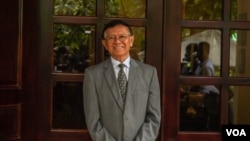A Cambodian court on Friday closed the investigation into treason charges against opposition leader Kem Sokha, with the investigating judge now expected to decide on whether to send the case to trial or drop the charges.
Kem Sokha was arrested in 2017 on treason charges for allegedly conspiring with foreign powers and after spending one year in a Tbong Khmum prison was released on bail in 2018 and kept under house arrest till Sunday, when the court changed his bail conditions to allow him to travel within the country.
Friday’s development also follows the release of the European Union’s report on possible suspension of the ‘Everything But Arms’ trade scheme, which was accessed by Radio Free Asia on Thursday.
The confidential report, leaked to RFA by senior officials, showed that the EU was very concerned about Cambodia’s human rights record and suggested there had been a further deterioration in the situation since the EU started monitoring the country in February.
Investigating Judge Ky Rithy issued the closure order on Friday, ending the investigation period. Ky Rithy could not be reached for comment and court spokesperson Y Rin only confirmed the closing order had been issued.
“We decide to close the investigation from now on,” said Ky Rithy in the document.
According to court procedures, the order now heads to the prosecutor in the case, who can ask for further investigation or send it back to the investigating judge. At this point, the judge will issue a final closing order to either send the case to trial or drop the charges.
Kem Sokha’s lawyer, Pheng Heng, said the defense team would continue to push the court to drop the charges rather than deal with a lengthy trial.
“The process of sending the case to trial depends on the availability of judges,” he said. “Some cases can take months or up to a year [for the trial].”
Kem Monovithya, Kem Sokha’s daughter and CNRP official, said international pressure on the Cambodian government had resulted in closure of the investigation and that domestic pressures had failed to deliver results.
“How can we say domestic pressure [is working]?” she said. “Activists have been arrested and beaten. They have pressured people not to stand up.”
The effects of the EU’s report can also be linked to Hun Sen’s directive to court officials to release jailed CNRP activists and members on bail, after they had been arrested for allegedly assisting CNRP leader Sam Rainsy’s attempted return. As of Friday evening, at least 30 people had been released from prison on bail.
Soeung Sen Karuna, a senior investigator for rights group Adhoc, welcomed the move but said long term reforms were needed to ensure political stability.
“For us, we don’t want to see only short-term solutions,” he said. “We want to see all politicians in Cambodia come together and solve the issue peacefully, rather than wait for international pressure.”




